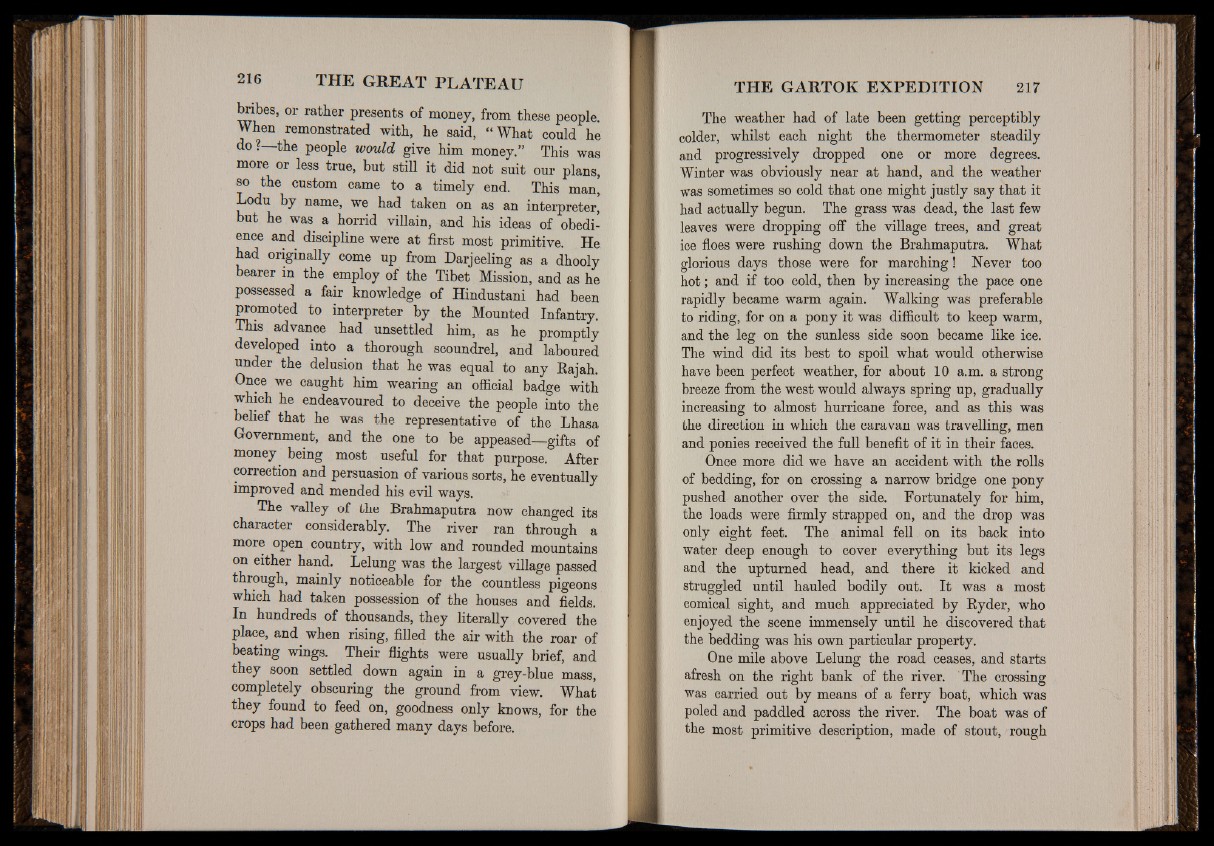
bribes, or ratber presents of money, from these people.
When remonstrated with, he said, “ What could he
do?—the people would give him money.” This was
more or less true, but still it did not suit our plans,
so the custom came to a timely end. This man,
Lodu by name, we had taken on as an interpreter,
but he was a horrid villain, and his ideas of obedience
and discipline were at first most primitive. He
had originally come up from Darjeeling as a dhooly
bearer in the employ of the Tibet Mission, and as he
possessed a fair knowledge of Hindustani had been
promoted to interpreter by the Mounted Infantry.
This advance had unsettled him, as he promptly
developed into a thorough scoundrel, and laboured
under the delusion that he was equal to any Rajah.
Once we caught him wearing an official badge with
which he endeavoured to deceive the people into the
belief that he was the representative of the Lhasa
Government, and the one to be appeased—gifts of
money being most useful for that purpose. After
correction and persuasion of various sorts, he eventually
improved and mended his evil ways.
The valley of the Brahmaputra now changed its
character considerably. The river ran through a
more open country, with low and rounded mountains
on either hand. Lelung was the largest village passed
through, mainly noticeable for the countless pigeons
which had taken possession of the houses and fields.
In hundreds of thousands, they literally covered the
place, and when rising, filled the air with the roar of
beating wings. Their flights were usually brief, and
they soon settled down again in a grey-blue mass,
completely obscuring the ground from view. What
they found to feed on, goodness only knows, for the
crops had been gathered many days before.
The weather had of late been getting perceptibly
colder, whilst each night the thermometer steadily
and progressively dropped one or more degrees.
Winter was obviously near at hand, and the weather
was sometimes so cold that one might justly say that it
had actually begun. The grass was dead, the last few
leaves were dropping off the village trees, and great
ice floes were rushing down the Brahmaputra. What
glorious days those were for marching! Never too
hot; and if too cold, then by increasing the pace one
rapidly became warm again. Walking was preferable
to riding, for on a pony it was difficult to keep warm,
and the leg on the sunless side soon became like ice.
The wind did its best to spoil what would otherwise
have been perfect weather, for about 10 a.m. a strong
breeze from the west would always spring up, gradually
increasing to almost hurricane force, and as this was
the direction in which the caravan was travelling, men
and ponies received the full benefit of it in their faces.
Once more did we have an accident with the rolls
of bedding, for on crossing a narrow bridge one pony
pushed another over the side. Fortunately for him,
the loads were firmly strapped on, and the drop was
only eight feet. The animal fell on its back into
water deep enough to cover everything but its legs
and the upturned head, and there it kicked and
struggled until hauled bodily out. It was a most
comical sight, and much appreciated by Ryder, who
enjoyed the scene immensely until he discovered that
the bedding was his own particular property.
One mile above Lelung the road ceases, and starts
afresh on the right bank of the river. The crossing
was carried out by means of a ferry boat, which was
poled and paddled across the river. The boat was of
the most primitive description, made of stout, rough